高中英语简单句5种基本类型 公开课课件(26张ppt)
文档属性
| 名称 | 高中英语简单句5种基本类型 公开课课件(26张ppt) | 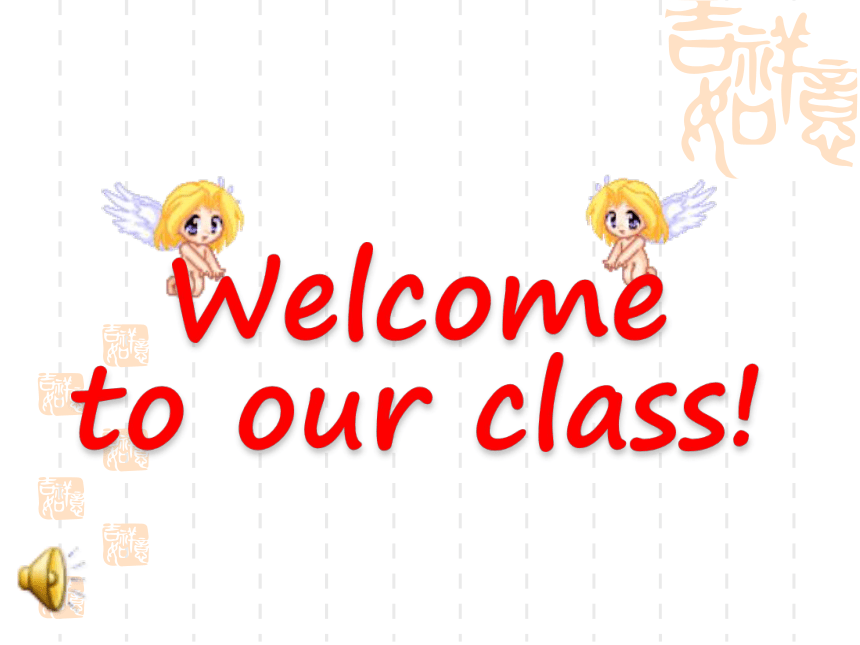 | |
| 格式 | ppt | ||
| 文件大小 | 1.6MB | ||
| 资源类型 | 教案 | ||
| 版本资源 | 通用版 | ||
| 科目 | 英语 | ||
| 更新时间 | 2020-09-19 19:37:16 | ||
图片预览


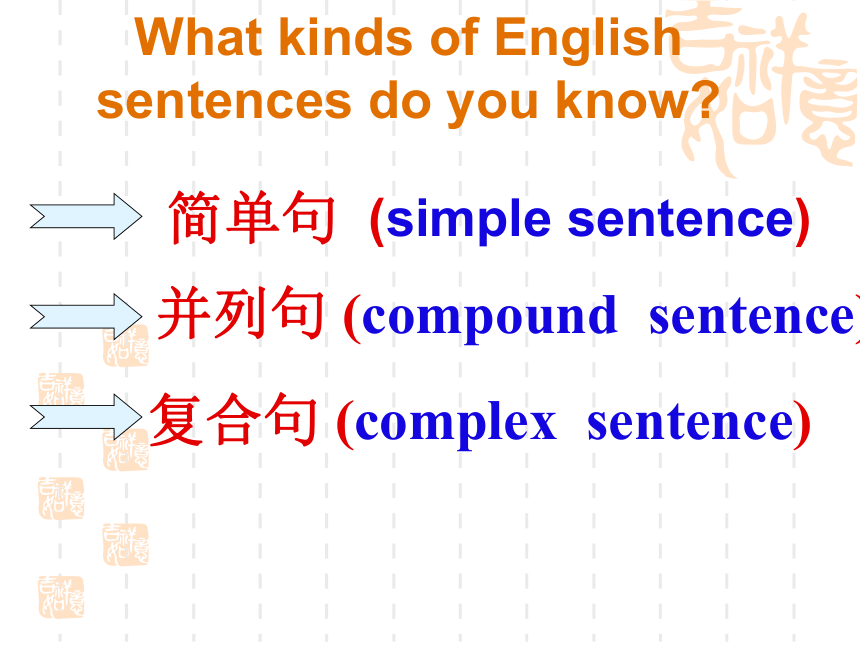
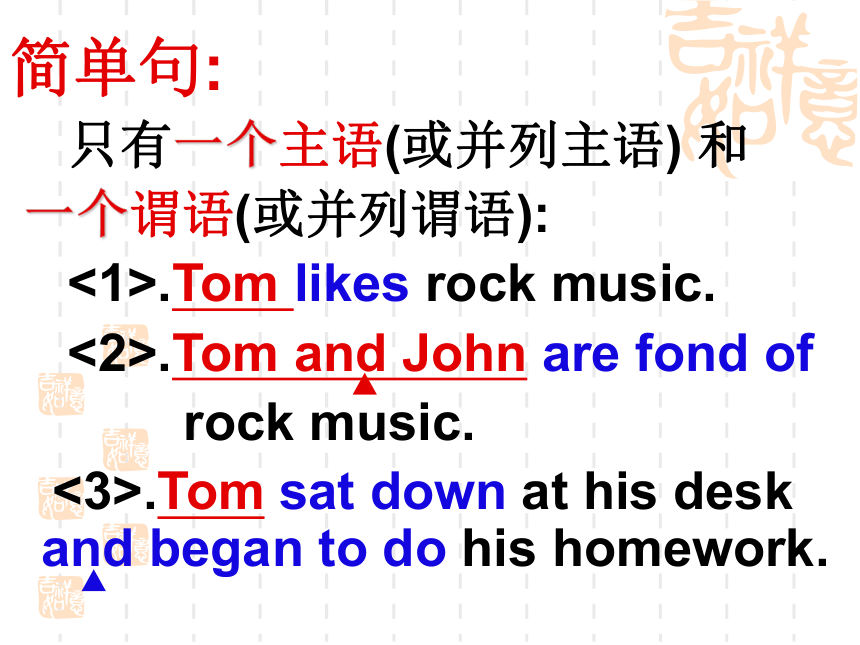
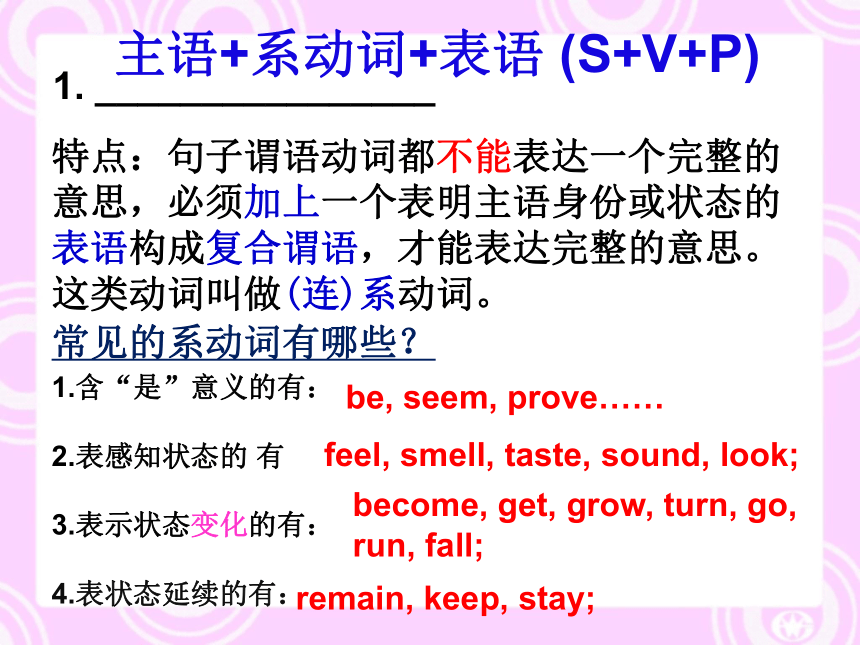
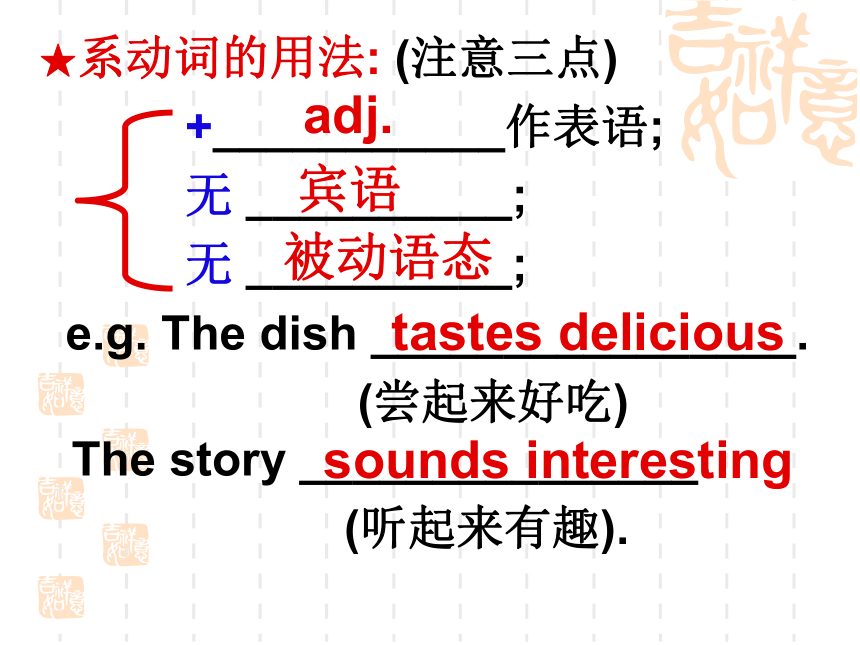
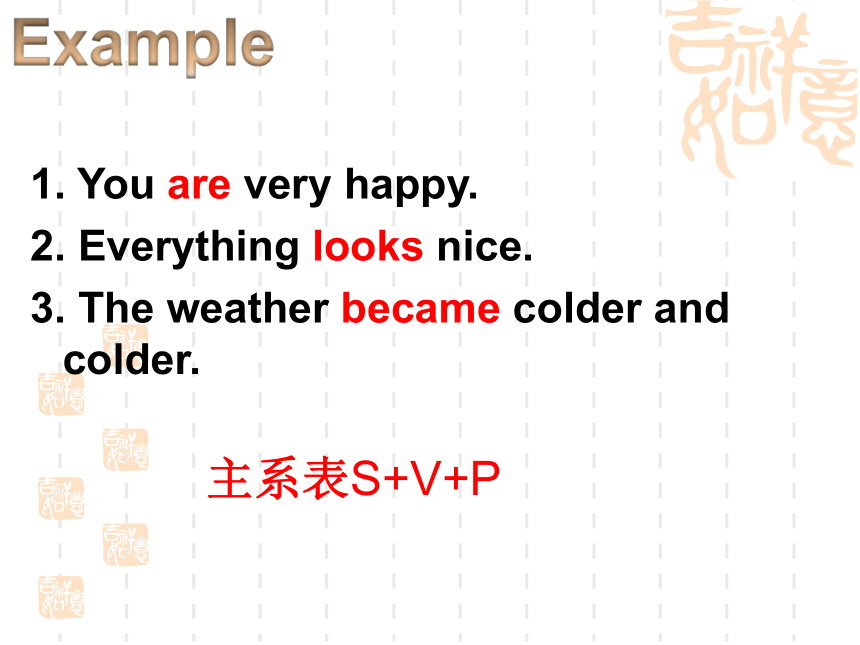

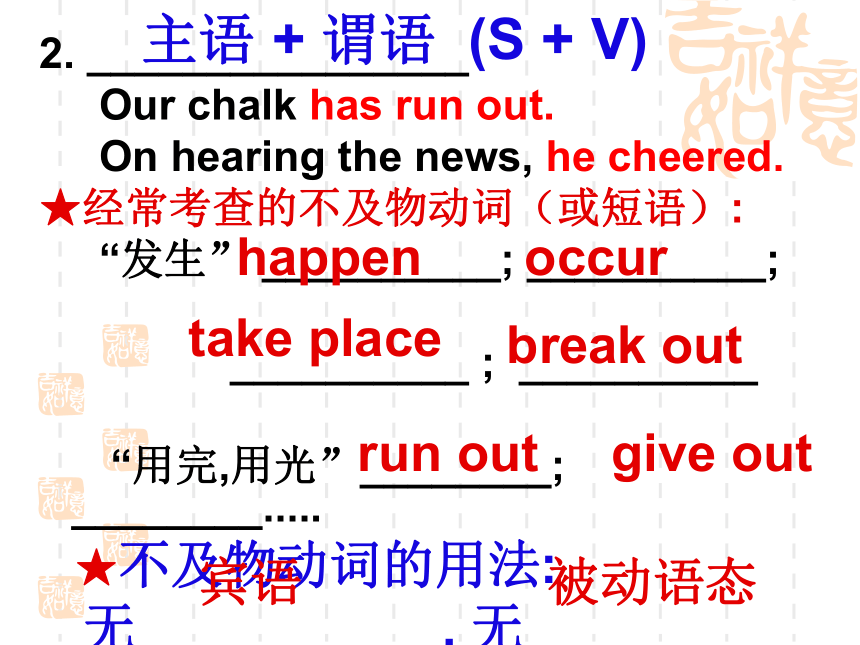
文档简介
简单句 (simple sentence)
简单句的
五种基本句型
(一).简单句:
只有一个主语(或并列主语) 和
一个谓语(或并列谓语):
<1>.Tom likes rock music.
<2>.Tom and John are fond of
rock music.
<3>.Tom sat down at his desk and began to do his homework.
★系动词的用法: (注意三点)
+___________作表语;
无 __________;
无 __________;
e.g. The dish ________________.
(尝起来好吃) The story _______________.
(听起来有趣).
2. ________________
Our chalk has run out.
On hearing the news, he cheered.
★经常考查的不及物动词(或短语):
“发生” __________; __________;
__________ ; __________
“用完,用光”________; ________.....
★不及物动词的用法:
无 __________, 无_________
单击此处编辑母版标题样式
*
*
*
单击此处编辑母版副标题样式
并列句 (compound sentence)
复合句 (complex sentence)
What kinds of English sentences do you know?
▲
▲
特点:句子谓语动词都不能表达一个完整的意思,必须加上一个表明主语身份或状态的表语构成复合谓语,才能表达完整的意思。这类动词叫做(连)系动词。
1.含“是”意义的有:
2.表感知状态的 有
3.表示状态变化的有:
4.表状态延续的有:
常见的系动词有哪些?
feel, smell, taste, sound, look;
become, get, grow, turn, go, run, fall;
remain, keep, stay;
be, seem, prove……
1. ________________
主语+系动词+表语 (S+V+P)
adj.
宾语
被动语态
tastes delicious
sounds interesting
主系表S+V+P
1. You are very happy.
2. Everything looks nice.
3. The weather became colder and colder.
beautiful
Correct mistakes:
Her voice sounds beautifully.
2. Jim was remained a worker.
主语 + 谓语 (S + V)
happen occur
take place
break out
run out give out
宾语
被动语态
(1)The teacher was speaking.
2.每天八点开始上课。(begin)
every day.
Classes begin
at eight
*
1.明天她会过来。(come)
She will come
tomorrow.
five years ago.
2.五年前我住在武汉。 (live)
I lived
in Wuhan
1、Translation
1、 Do you know what was happened yesterday?
\
2、Correct mistakes
基本句型 三
S +V +O(主+谓+宾)
特点:谓语动词都是实义动词,但不能表
达完整的意思,必须跟宾语(即该动作的承受者)才能使意思完整。此时,这类动词叫做及物动词或者短语。
常见的及物动词有:like, enjoy, desire, expect, look for, take care of等等。
e.g. We like the movie.
S
V
o
*
*
1.昨晚我写了一封信。
2.这本书我已经读过多次了。
I wrote a letter last night.
I have read this book many times.
Translation
基本句型 四
S +V +IO +DO(主+谓+间宾+直宾)
特点:谓语动词必须跟有两个宾语才能表达完
整的意思。这两个宾语一个是动作的直接承受者,另一个是动作的间接承受者。
通常可改为:
e.g. She gave Tom an apple.
I bought him a pen yesterday.
主 +谓+直宾+介词+间宾
=She gave an apple to Tom.
=She bought a pen for him
基本句型 四
S +V +IO +DO(主+谓+间宾+直宾)
my pictures.
a beautiful skirt.
him
me
showed
bought
1. I
2. He
DO(多指物)
Io(多指人)
V(及物)
S
若要先说出直接宾语,后说间接宾语,则要借助与介词to 或for。
He bought me a beautiful skirt.
He bought a beautiful skirt for me.
用to侧重指动作的方向,表示朝着,向着,对着某人。
用for 侧重指动作的受益者,表示为了某人,替某人。
常跟双宾语的动词有:
(需借助 to的)bring, give, lend, offer, pass, pay,
teach, tell, write, ask等
(需借助for的)buy, call, cook, choose, find, get, 等。
*
1. 今年刘老师教我们数学。 (teach)
2.昨晚她给我们讲了一个有趣的故事。(tell)
3. 你能把那本字典递给我吗? (pass)
Mr. Liu teaches us maths
this year.
She told us an interesting story
last night.
Could you pass me the dictionary?
基本句型 五
S +V +O +OC(主+谓+宾+宾补)
特点:动词虽然是及物动词,但是只跟一个宾
语还不能表达完整的意思,必须加上一个补充成分来补足宾语,才能使意思完整。
判断原则:此类结构能表达成—
(宾语)是…/要做…
e.g. We made him the manager.
主
谓
宾
宾补
I heard him singing.
I saw him writing a letter.
2. I find maths difficult.
3. We call her Lily.
4. Father asked me to turn off the TV.
分析下列句子的结构及其成分。
1.Plants need water.
S+V+O ( 主 + 谓+ 宾 )
2.The flower is so fresh.
S +V +P (主 + 系 + 表)
3.They work hard.
S +V (主 + 谓 )
4.He gives me some seeds.
S +V +IO + DO (主 + 谓 + 间宾 + 直宾)
5.We should keep the classroom clean.
S+V +O +OC (主 + 谓 + 宾 + 宾补)
更正下列句子的错误
Exercises :
1. He came the room.
2. The music sounds.
3. I have seen.
4. He gave a pen me.
5. My father bought a book to me.
1. He came into the room.
2. The music sounds wonderful.
3. I have seen the film.
4. He gave a pen to me.
5. My father bought a book for me .
Exercises :
翻译下列句子并分析句子结构:
1.我经常在早晨读英语。 2.玛丽是个聪明的学生。
3.我的老师交给我一封信。4.我母亲经常叫我努力学习。
5.我们叫我们的老师王先生 6.他正在房里做家庭作业。
1. I often read English in the morning.
2. Mary is a clever student.
3. My teacher gave me a letter.
4. My mother often asks me to study hard.
5. We call our teacher Mr. Wang.
6. He is doing his homework in the room.
主 + 谓 + 宾
主 + 系 + 表
主 + 谓 + 双宾
主+ 谓 + 宾 +宾补
主+ 谓 + 宾 + 宾补
主 + 谓 + 宾
请用所学知识完成下面的小作文。
Our class is made up of 27 members. This is a big family. We always help each other.
我们的班长是一个男孩。1、_____________.He studies very hard, and he is always ready to help others. 我们都很喜欢他。2、___________________
Our class is happy group, which is full of laughter. Each teacher is willing to help us solve the problems both in study and life. 英语老师经常给我们讲有趣的故事。 3.______________________ To enter an ideal university, we work together, 4._________ make progress together and try our best to achieve our dreams.
Suggested answer:
Our class is made up of 27 members. This is a big family. We always help each other.
Our monitor is a boy. He studies very hard, and he is always ready to help others.
Our class is happy group, which is full of laughter. Each teacher is willing to help us solve the problems both in study and life. To enter an ideal university, we work together, make progress together and try our best to achieve our dreams.
简单句 (simple sentence)
简单句:
只有一个主语(或并列主语) 和
一个谓语(或并列谓语):
<1>.Tom likes rock music.
<2>.Tom and John are fond of
rock music.
<3>.Tom sat down at his desk and began to do his homework.
★系动词的用法: (注意三点)
+___________作表语;
无 __________;
无 __________;
e.g. The dish ________________.
(尝起来好吃) The story _______________.
(听起来有趣).
2. ________________
Our chalk has run out.
On hearing the news, he cheered.
★经常考查的不及物动词(或短语):
“发生” __________; __________;
__________ ; __________
“用完,用光”________; ________.....
★不及物动词的用法:
无 __________, 无_________
▲
▲
*
1.明天她会过来。(come)
She will come
tomorrow.
five years ago.
2.五年前我住在武汉。 (live)
I lived
in Wuhan
1、Translation
1、 Do you know what was happened yesterday?
\
2、Correct mistakes
*
*
1.昨晚我写了一封信。
2.这本书我已经读过多次了。
I wrote a letter last night.
I have read this book many times.
Translation
*
1. 今年刘老师教我们数学。 (teach)
2.昨晚她给我们讲了一个有趣的故事。(tell)
3. 你能把那本字典递给我吗? (pass)
Mr. Liu teaches us maths
this year.
She told us an interesting story
last night.
Could you pass me the dictionary?
请用所学知识完成下面的小作文。
Our class is made up of 42 members. This is a big family. We always help each other.
我们的班长是一个男孩。1.____________.He studies very hard.We call him bookworm,2.________________and he is always ready to help others. 我们都很喜欢他。3._________________
Our class is happy group, which is full of laughter. Each teacher is willing to help us solve the problems both in study and life. 英语老师经常给我们讲有趣的故事。 4.______________________ To enter an ideal university, we work together, 5._________ make progress together and try our best to achieve our dreams.
简单句 (simple sentence)
简单句:
只有一个主语(或并列主语) 和
一个谓语(或并列谓语):
<1>.Tom likes rock music.
<2>.Tom and John are fond of
rock music.
<3>.Tom sat down at his desk and began to do his homework.
★系动词的用法: (注意三点)
+___________作表语;
无 __________;
无 __________;
e.g. The dish ________________.
(尝起来好吃) The story _______________.
(听起来有趣).
2. ________________
Our chalk has run out.
On hearing the news, he cheered.
★经常考查的不及物动词(或短语):
“发生” __________; __________;
__________ ; __________
“用完,用光”________; ________.....
★不及物动词的用法:
无 __________, 无_________
请用所学知识完成下面双向翻译,并分析句子结构。
Our class is made up of 42 members. This is a big family. We always help each other.
Our monitor is a boy. He studies very hard.We call him bookworm,1.________________and he is always ready to help others. 我们都很喜欢他。2._________________
Our class is happy group,3.____________ which is full of laughter. Each teacher is willing to help us solve the problems both in study and life. 英语老师经常给我们讲有趣的故事。 4.______________________ To enter an ideal university, we work together, 5._________ make progress together and try our best to achieve our dreams.
简单句 (simple sentence)
简单句:
只有一个主语(或并列主语) 和
一个谓语(或并列谓语):
<1>.Tom likes rock music.
<2>.Tom and John are fond of
rock music.
<3>.Tom sat down at his desk and began to do his homework.
★系动词的用法: (注意三点)
+___________作表语;
无 __________;
无 __________;
e.g. The dish ________________.
(尝起来好吃) The story _______________.
(听起来有趣).
2. ________________
Our chalk has run out.
On hearing the news, he cheered.
★经常考查的不及物动词(或短语):
“发生” __________; __________;
__________ ; __________
“用完,用光”________; ________.....
★不及物动词的用法:
无 __________, 无_________
主语 + 谓语 (S + V)
happen occur
take place
break out
run out give out
宾语
被动语态
*
1.明天她会过来。(come)
She will come
tomorrow.
five years ago.
2.五年前我住在武汉。 (live)
I lived
in Wuhan
1、Translation
Do you know what was happened yesterday?
\
2、Correct the mistake
简单句的
五种基本句型
(一).简单句:
只有一个主语(或并列主语) 和
一个谓语(或并列谓语):
<1>.Tom likes rock music.
<2>.Tom and John are fond of
rock music.
<3>.Tom sat down at his desk and began to do his homework.
★系动词的用法: (注意三点)
+___________作表语;
无 __________;
无 __________;
e.g. The dish ________________.
(尝起来好吃) The story _______________.
(听起来有趣).
2. ________________
Our chalk has run out.
On hearing the news, he cheered.
★经常考查的不及物动词(或短语):
“发生” __________; __________;
__________ ; __________
“用完,用光”________; ________.....
★不及物动词的用法:
无 __________, 无_________
单击此处编辑母版标题样式
*
*
*
单击此处编辑母版副标题样式
并列句 (compound sentence)
复合句 (complex sentence)
What kinds of English sentences do you know?
▲
▲
特点:句子谓语动词都不能表达一个完整的意思,必须加上一个表明主语身份或状态的表语构成复合谓语,才能表达完整的意思。这类动词叫做(连)系动词。
1.含“是”意义的有:
2.表感知状态的 有
3.表示状态变化的有:
4.表状态延续的有:
常见的系动词有哪些?
feel, smell, taste, sound, look;
become, get, grow, turn, go, run, fall;
remain, keep, stay;
be, seem, prove……
1. ________________
主语+系动词+表语 (S+V+P)
adj.
宾语
被动语态
tastes delicious
sounds interesting
主系表S+V+P
1. You are very happy.
2. Everything looks nice.
3. The weather became colder and colder.
beautiful
Correct mistakes:
Her voice sounds beautifully.
2. Jim was remained a worker.
主语 + 谓语 (S + V)
happen occur
take place
break out
run out give out
宾语
被动语态
(1)The teacher was speaking.
2.每天八点开始上课。(begin)
every day.
Classes begin
at eight
*
1.明天她会过来。(come)
She will come
tomorrow.
five years ago.
2.五年前我住在武汉。 (live)
I lived
in Wuhan
1、Translation
1、 Do you know what was happened yesterday?
\
2、Correct mistakes
基本句型 三
S +V +O(主+谓+宾)
特点:谓语动词都是实义动词,但不能表
达完整的意思,必须跟宾语(即该动作的承受者)才能使意思完整。此时,这类动词叫做及物动词或者短语。
常见的及物动词有:like, enjoy, desire, expect, look for, take care of等等。
e.g. We like the movie.
S
V
o
*
*
1.昨晚我写了一封信。
2.这本书我已经读过多次了。
I wrote a letter last night.
I have read this book many times.
Translation
基本句型 四
S +V +IO +DO(主+谓+间宾+直宾)
特点:谓语动词必须跟有两个宾语才能表达完
整的意思。这两个宾语一个是动作的直接承受者,另一个是动作的间接承受者。
通常可改为:
e.g. She gave Tom an apple.
I bought him a pen yesterday.
主 +谓+直宾+介词+间宾
=She gave an apple to Tom.
=She bought a pen for him
基本句型 四
S +V +IO +DO(主+谓+间宾+直宾)
my pictures.
a beautiful skirt.
him
me
showed
bought
1. I
2. He
DO(多指物)
Io(多指人)
V(及物)
S
若要先说出直接宾语,后说间接宾语,则要借助与介词to 或for。
He bought me a beautiful skirt.
He bought a beautiful skirt for me.
用to侧重指动作的方向,表示朝着,向着,对着某人。
用for 侧重指动作的受益者,表示为了某人,替某人。
常跟双宾语的动词有:
(需借助 to的)bring, give, lend, offer, pass, pay,
teach, tell, write, ask等
(需借助for的)buy, call, cook, choose, find, get, 等。
*
1. 今年刘老师教我们数学。 (teach)
2.昨晚她给我们讲了一个有趣的故事。(tell)
3. 你能把那本字典递给我吗? (pass)
Mr. Liu teaches us maths
this year.
She told us an interesting story
last night.
Could you pass me the dictionary?
基本句型 五
S +V +O +OC(主+谓+宾+宾补)
特点:动词虽然是及物动词,但是只跟一个宾
语还不能表达完整的意思,必须加上一个补充成分来补足宾语,才能使意思完整。
判断原则:此类结构能表达成—
(宾语)是…/要做…
e.g. We made him the manager.
主
谓
宾
宾补
I heard him singing.
I saw him writing a letter.
2. I find maths difficult.
3. We call her Lily.
4. Father asked me to turn off the TV.
分析下列句子的结构及其成分。
1.Plants need water.
S+V+O ( 主 + 谓+ 宾 )
2.The flower is so fresh.
S +V +P (主 + 系 + 表)
3.They work hard.
S +V (主 + 谓 )
4.He gives me some seeds.
S +V +IO + DO (主 + 谓 + 间宾 + 直宾)
5.We should keep the classroom clean.
S+V +O +OC (主 + 谓 + 宾 + 宾补)
更正下列句子的错误
Exercises :
1. He came the room.
2. The music sounds.
3. I have seen.
4. He gave a pen me.
5. My father bought a book to me.
1. He came into the room.
2. The music sounds wonderful.
3. I have seen the film.
4. He gave a pen to me.
5. My father bought a book for me .
Exercises :
翻译下列句子并分析句子结构:
1.我经常在早晨读英语。 2.玛丽是个聪明的学生。
3.我的老师交给我一封信。4.我母亲经常叫我努力学习。
5.我们叫我们的老师王先生 6.他正在房里做家庭作业。
1. I often read English in the morning.
2. Mary is a clever student.
3. My teacher gave me a letter.
4. My mother often asks me to study hard.
5. We call our teacher Mr. Wang.
6. He is doing his homework in the room.
主 + 谓 + 宾
主 + 系 + 表
主 + 谓 + 双宾
主+ 谓 + 宾 +宾补
主+ 谓 + 宾 + 宾补
主 + 谓 + 宾
请用所学知识完成下面的小作文。
Our class is made up of 27 members. This is a big family. We always help each other.
我们的班长是一个男孩。1、_____________.He studies very hard, and he is always ready to help others. 我们都很喜欢他。2、___________________
Our class is happy group, which is full of laughter. Each teacher is willing to help us solve the problems both in study and life. 英语老师经常给我们讲有趣的故事。 3.______________________ To enter an ideal university, we work together, 4._________ make progress together and try our best to achieve our dreams.
Suggested answer:
Our class is made up of 27 members. This is a big family. We always help each other.
Our monitor is a boy. He studies very hard, and he is always ready to help others.
Our class is happy group, which is full of laughter. Each teacher is willing to help us solve the problems both in study and life. To enter an ideal university, we work together, make progress together and try our best to achieve our dreams.
简单句 (simple sentence)
简单句:
只有一个主语(或并列主语) 和
一个谓语(或并列谓语):
<1>.Tom likes rock music.
<2>.Tom and John are fond of
rock music.
<3>.Tom sat down at his desk and began to do his homework.
★系动词的用法: (注意三点)
+___________作表语;
无 __________;
无 __________;
e.g. The dish ________________.
(尝起来好吃) The story _______________.
(听起来有趣).
2. ________________
Our chalk has run out.
On hearing the news, he cheered.
★经常考查的不及物动词(或短语):
“发生” __________; __________;
__________ ; __________
“用完,用光”________; ________.....
★不及物动词的用法:
无 __________, 无_________
▲
▲
*
1.明天她会过来。(come)
She will come
tomorrow.
five years ago.
2.五年前我住在武汉。 (live)
I lived
in Wuhan
1、Translation
1、 Do you know what was happened yesterday?
\
2、Correct mistakes
*
*
1.昨晚我写了一封信。
2.这本书我已经读过多次了。
I wrote a letter last night.
I have read this book many times.
Translation
*
1. 今年刘老师教我们数学。 (teach)
2.昨晚她给我们讲了一个有趣的故事。(tell)
3. 你能把那本字典递给我吗? (pass)
Mr. Liu teaches us maths
this year.
She told us an interesting story
last night.
Could you pass me the dictionary?
请用所学知识完成下面的小作文。
Our class is made up of 42 members. This is a big family. We always help each other.
我们的班长是一个男孩。1.____________.He studies very hard.We call him bookworm,2.________________and he is always ready to help others. 我们都很喜欢他。3._________________
Our class is happy group, which is full of laughter. Each teacher is willing to help us solve the problems both in study and life. 英语老师经常给我们讲有趣的故事。 4.______________________ To enter an ideal university, we work together, 5._________ make progress together and try our best to achieve our dreams.
简单句 (simple sentence)
简单句:
只有一个主语(或并列主语) 和
一个谓语(或并列谓语):
<1>.Tom likes rock music.
<2>.Tom and John are fond of
rock music.
<3>.Tom sat down at his desk and began to do his homework.
★系动词的用法: (注意三点)
+___________作表语;
无 __________;
无 __________;
e.g. The dish ________________.
(尝起来好吃) The story _______________.
(听起来有趣).
2. ________________
Our chalk has run out.
On hearing the news, he cheered.
★经常考查的不及物动词(或短语):
“发生” __________; __________;
__________ ; __________
“用完,用光”________; ________.....
★不及物动词的用法:
无 __________, 无_________
请用所学知识完成下面双向翻译,并分析句子结构。
Our class is made up of 42 members. This is a big family. We always help each other.
Our monitor is a boy. He studies very hard.We call him bookworm,1.________________and he is always ready to help others. 我们都很喜欢他。2._________________
Our class is happy group,3.____________ which is full of laughter. Each teacher is willing to help us solve the problems both in study and life. 英语老师经常给我们讲有趣的故事。 4.______________________ To enter an ideal university, we work together, 5._________ make progress together and try our best to achieve our dreams.
简单句 (simple sentence)
简单句:
只有一个主语(或并列主语) 和
一个谓语(或并列谓语):
<1>.Tom likes rock music.
<2>.Tom and John are fond of
rock music.
<3>.Tom sat down at his desk and began to do his homework.
★系动词的用法: (注意三点)
+___________作表语;
无 __________;
无 __________;
e.g. The dish ________________.
(尝起来好吃) The story _______________.
(听起来有趣).
2. ________________
Our chalk has run out.
On hearing the news, he cheered.
★经常考查的不及物动词(或短语):
“发生” __________; __________;
__________ ; __________
“用完,用光”________; ________.....
★不及物动词的用法:
无 __________, 无_________
主语 + 谓语 (S + V)
happen occur
take place
break out
run out give out
宾语
被动语态
*
1.明天她会过来。(come)
She will come
tomorrow.
five years ago.
2.五年前我住在武汉。 (live)
I lived
in Wuhan
1、Translation
Do you know what was happened yesterday?
\
2、Correct the mistake
